S’pore startup Carro looks to raise S$136M in pre-IPO funding round, aims for S$2B valuation
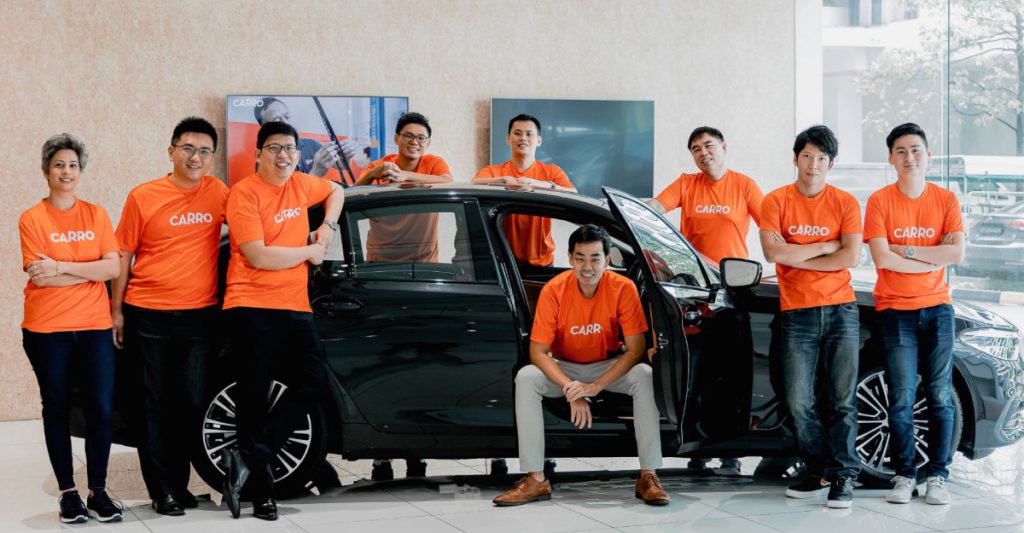
Used-car marketplace Carro is currently in talks for a pre-IPO (initial public offering) funding round which could raise its valuation to more than S$2 billion, Bloomberg reports.
According to chief executive officer Aaron Tan, the company is raising about S$136 million, hoping that these new funds will cement Carro as Southeast Asia’s top player.
“We are ready for an IPO,” Tan said. “Whether or not we list depends on the broader macro environment.”
The Singapore-based firm, whose investors include SoftBank Group and Temasek, just posted its first annual operating profit despite operating in a highly competitive market that is resistant to change. Earnings before interest, taxes, depreciation and amortisation jumped to over US$33 million for the year ended last month, from US$4 million a year earlier.
Employing technology to stay ahead of the competition
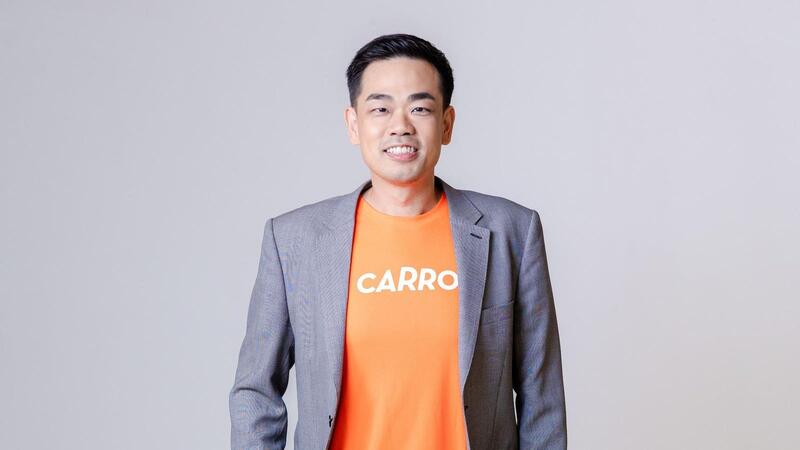
To stay ahead of competitors, Carro relies on technology and innovation to capture market share. For instance, the company has launched a tool that can analyse the health of a second-hand car from the sound of its motor and introduced Amazon-like features, such as no-quibble returns and delivery within a few days, which are both unheard-of in many parts of Southeast Asia.
Over the past nine years, the firm has invested hundreds of millions of dollars to acquire inventory, build out delivery networks, set up refurbishment centres and fit out used-car showrooms.
As a result, more consumers in Southeast Asia are starting to skip traditional dealerships and buy used cars online.
But the challenge lies in how well the firm can leverage technology to better predict vehicle prices and conditions, shorten the time taken to prepare cars for their new owners, and promote a suite of products, including loans and insurance.
To move tens of thousands of cars each month, Carro has to oversee over a hundred trailers each day, plan efficient routes to drop off vehicles from one city to another and manage more than US$100 million in inventory at any given point.
To streamline this, the firm has built a QR code dashboard to track cars at each stage of the trading, refurbishment and delivery process. On average, cars stay with Carro for about 26 days, while it takes about 45 days for its Malaysia-based rival firm, Carsome, to sell a vehicle to a consumer.
Recently, the company has also been busy taking more strategic moves, such as expanding into Hong Kong and rebranding its subsidiary in Malaysia.
A rocky road ahead
However, Carro must prepare for a challenging road ahead. The Southeast Asian tech industry has been hard-hit by layoffs, CEO resignations and declining startup valuations, presenting significant hurdles for companies seeking to go public.
Shares of regional tech giants, including Grab, Sea Group and GoTo, have waned as they work to balance growth and profitability.
Meanwhile, the decline in used car prices adds to the challenge of profiting from vehicle sales. Highinterest rates and inflation are driving up the costs of car loans, rendering them less accessible for buyers.
Featured Image Credit: Carro
Also Read: South Korean convenience store chain Emart24 under probe for failing to pay salaries
The end of coding? Microsoft publishes a framework making developers merely supervise AI
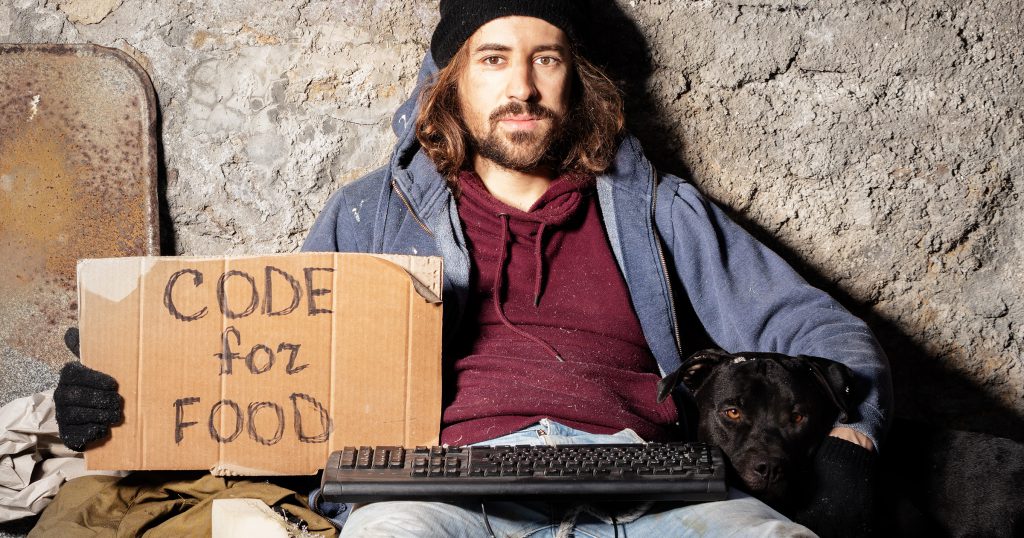
Two months ago, Jensen Huang, Nvidia’s CEO, dismissed the past 15 years of global career advice and advised that it’s not a good idea to learn to code anymore—at least not for most people.
Last month, Microsoft added its own contribution to the argument by releasing a research paper detailing AutoDev: an automated AI-driven development framework, in which human developers are relegated to the role of mere supervisors of artificial intelligence doing all of the actual software engineering work.
Goodbye, developers?
The authors have outlined—and successfully tested—a system of multiple AI agents interacting with each other as well as provided repositories to not only tackle complex software engineering tasks but also validate the outcomes on their own.
The role of humans, in their own words: “transforms from manual actions and validation of AI suggestions to a supervisor overseeing multi-agent collaboration on tasks, with the option to provide feedback. Developers can monitor AutoDev’s progress toward goals by observing the ongoing conversation used for communication among agents and the repository.”
In other words, instead of writing code, human developers would become spectators to the work of AI, interjecting whenever deemed necessary.
It’s really more akin to a management role, where you work with a team of people, guiding them towards the goals set for a project.
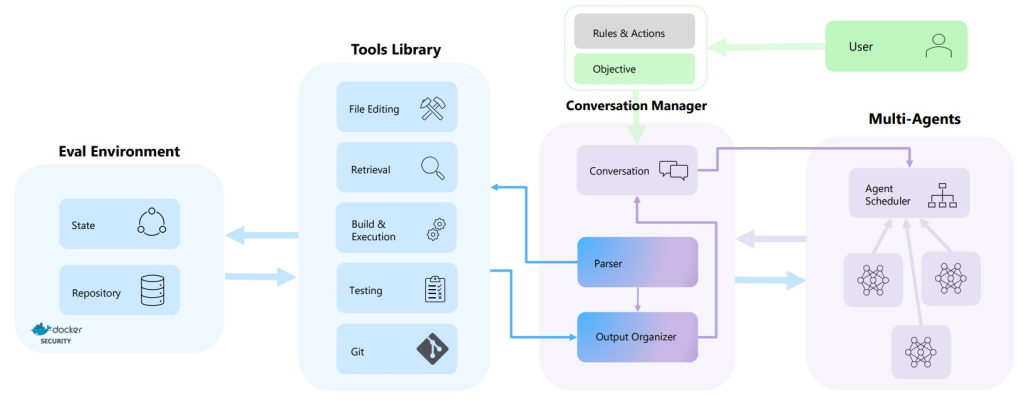
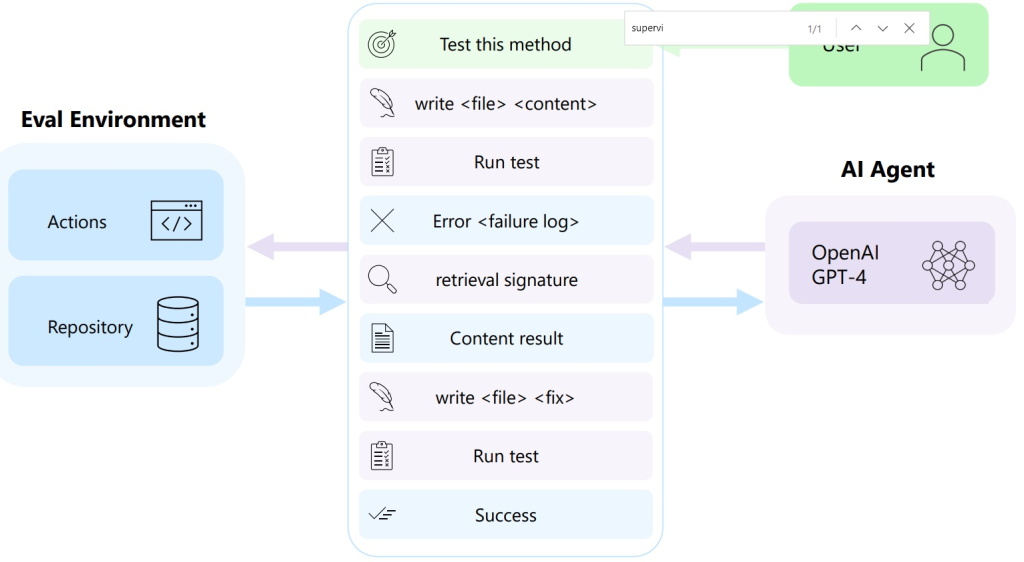
“We’ve shifted the responsibility of extracting relevant context for software engineering tasks and validating AI-generated code from users (mainly developers) to the AI agents themselves.”
But if that’s the case do we need human developers anymore? And what sort of skill should they have or acquire to remain useful in this AI-enabled workplace?
Will machines require soft skills in the future?
The conclusion to this evolutionary process may be unsettling to many—particularly to those highly-talented but reclusive software engineers who prefer working alone, dreading social interaction.
Well, as it happens, social skills may soon be required to… interact with machines.
Since all conversational models are essentially mimicking human communication, AI tools will require similar skills of their users as other humans would.

Fortunately, nobody is planning to equip computers with human emotions, so at least this aspect of teamwork is unlikely to become a problem, but many developers who today simply write code will now have to specialise in explaining it rather than executing themselves.
This certainly wasn’t a challenge that most techies foresaw when they entered the field but may very soon become a do or die situation for them.
If you’re not an effective supervisor, instructing machines to do the right things, your value in most companies may go down and not up, despite your highly specialised knowledge.
Software engineering path has just become less predictable
There will still be jobs for human programmers, of course, but they are more likely to be available in the companies that make the technology underpinning AI. After all, some future development and maintenance will have to be done by humans, if only as a safety measure.
That said, the pool of vacancies for software engineering experts will be draining quickly, unless you’re a competent communicator with a dose of managerial skills to competently run your own team of AI agents.
Perhaps the worst thing of all is that the creeping of AI into the field makes it very unpredictable as to what skills you should master as a future developer.
This is because we’re still looking for an answer to the fundamental question—if AI replaces most of us, will there be any humans left competent enough to modify the code if things go wrong in the future?
We have some examples of that in ancient IT systems written in outdated languages that few people know well enough to manage, not to mention update.
Since the demand for expertise in e.g. COBOL has gone down with time, there simply aren’t enough people to tackle the problems of old financial or government systems, which often hold millions of critical records of customers and nation’s citizens.
One could easily see how AI could have a similar impact, just on a far larger scale.
It’s a chicken or egg situation: what comes first? You need development skills to understand what AI is doing but how do you learn if AI is doing everything?
If you no longer need to master hard programming skills in any field, how many people will be left to fix things if they go wrong and we’re overly dependent on artificial intelligence?
This isn’t just a problem of reduced attractiveness as a candidate, retaining skills in technologies most companies won’t need you to do anything in, but a fundamental lack of practice, since it would only be needed in rare emergencies.
You can’t be good at something you rarely do.
How do you plan for a career in tech?
It used to be simple: you specialised in a specific field, mastered the required tools and languages, continuously updated your skill set as the technology advanced, and you could expect to be a well-paid, sought after professional eventually.
But now the value of your technical expertise vs. the ability to juggle AI bots coming up with solutions on their own flips it all on its head.
Experts with years of practice are likely to remain in demand (a bit like an old mechanic still fixing modern cars today – they may be different, but many fundamentals remain the same, and his experience can’t easily be gained anymore). But young students in computer science will have a tough nut to crack picking between hard skills and competency in using AI tools to achieve the same or better outcome.
There will be some jobs for highly-specialised experts and many jobs for those simply interacting with chatbots. But those stuck in the middle will soon have to pick their future between the two.
It’s whether you have what it takes to climb to the top or descend down to compete with Zoomers getting their AI-enabled coding lessons on TikTok.
Featured Image Credit: 123RF
Also Read: AI salaries surge amid tech industry downturn, with data scientists earning up to over S$17K/mnth
This Swedish greentech startup won the LKY biz competition, now has plans to expand here
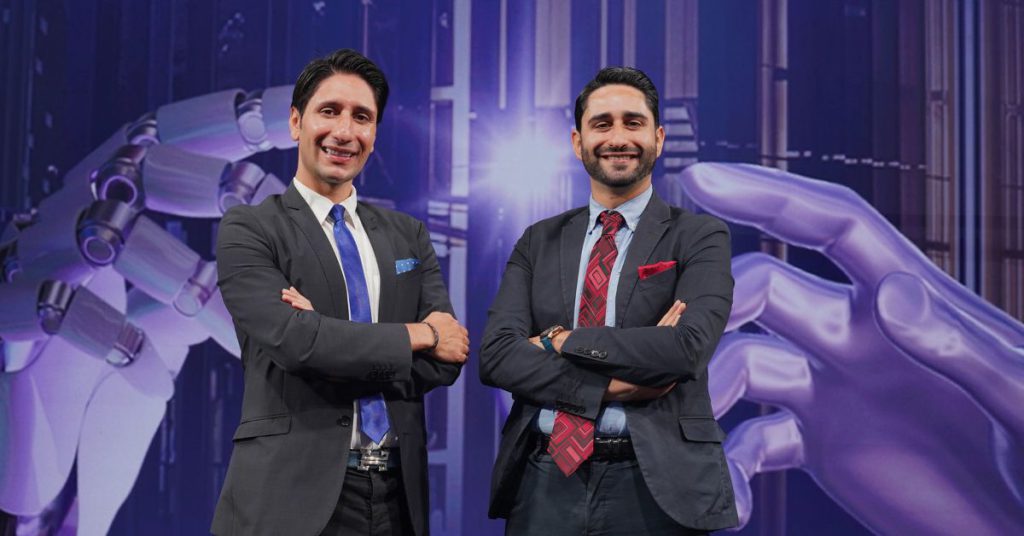
Organised by the Singapore Management University Institute of Innovation and Entrepreneurship (SMU IIE), the Lee Kuan Yew Global Business Plan Competition (LKYGBPC) is regarded as one of Asia’s largest university-led startup challenges.
Its latest edition ran last September, and the business that was crowned the Grand Winner was PlasticFri—a greentech company hailing all the way from Sweden.
Starting PlasticFri
PlasticFri was founded by brothers Max and Allen, with the mission to end plastic pollution.
Describing himself as a visionary social entrepreneur, Max told Vulcan Post that his personal drive to create an impact has been the fuel for his entrepreneurial journey. As such, he has founded four companies, and also made a major exit.
Although PlasticFri was only officially registered as a company in 2018, the actual genesis of the brothers’ work stems from over a decade prior as a side project. And the inspiration extends even further back.

“Whenever we were out in the nature, our parents asked us to spend a few minutes picking up garbage before starting to play around,” Max recalled his childhood. “This became a habit which continued into adulthood, and we still make time for that today.”
But as adults, the two realised that these small efforts were sadly not scalable—most of the garbage they found in the nature was plastic waste and it never stopped accumulating.
Thus, over a decade ago, they started working on a side project, seeking a more scalable solution.
“In 2018, we had a breakthrough and succeeded with promising results beyond the lab and developing the core technology,” Max said.
Fast forward to today, PlasticFri offers a range of plant-based and eco-friendly products that are designed to replace plastics. Particularly, they offer waste bags, fruit bags, pet bags, aprons, paper cups, paper lids, paper straws, paper bags, carrier bags, and mailers.
For their work, Max and Allen have been recognised by many platforms. They were named one of Sweden’s most powerful leaders in sustainability, selected by Forbes magazine’s 30 Under 30, and awarded the Prince Daniel Fellowship.
And of course, now they’re also the 11th LKYGBPC’s Grand Winner.
Competing with top talents
According to its website, the LKYGBPC brings some of the world’s most talented to Singapore, connecting them with Southeast Asia’s industry titans, academia, and investors.
Max told us that PlasticFri had received an invitation through their network to join the LKYGBPC.
But the main reason for joining was to evaluate Singapore as a hub for PlasticFri’s expansion in the region, as well as allow the business to showcase their innovation and build partnerships.
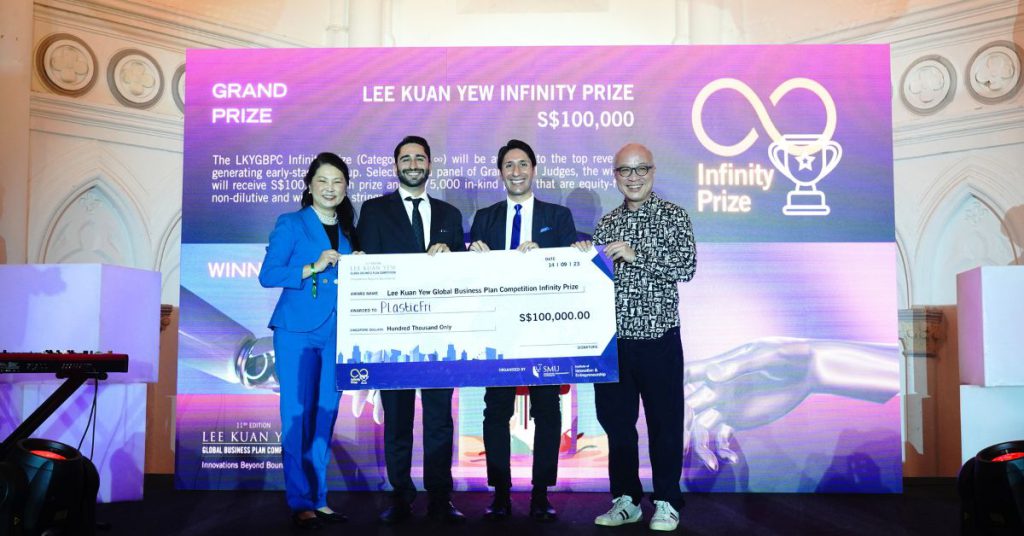
“We are exploring to expand our presence in the Asia Pacific region, especially in Southeast Asia and Singapore, where there is a strong demand for eco-friendly solutions,” Max elaborated.
As a winner, PlasticFri had received S$100,000 in cash and S$75,000 in-kind prizes. But more than that, the startup also received the opportunity to be mentored by notable venture capitalists (VCs) in the innovation and entrepreneurship space for expansion in the region.
In terms of connections, PlasticFri was able to work with Elaine Heng, NTUC FairPrice’s Deputy Group CEO & CEO of Retail Business.
Through that link-up, PlasticFri is currently in the process of ongoing pilots with FairPrice, and is in dialogue for a commercial deal with another local client.
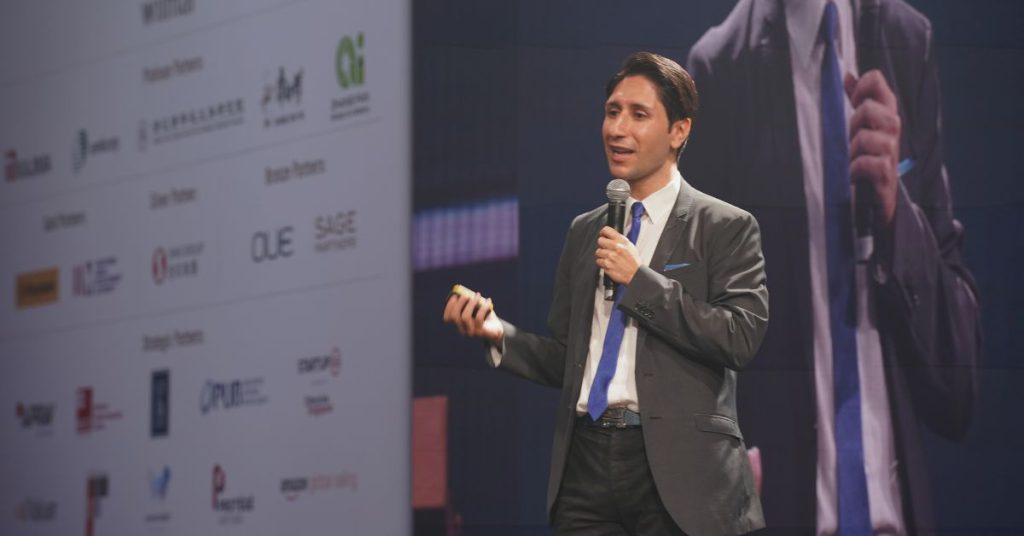
Changing the future
So, what’s next following this pilot? Will FairPrice be switching to exclusively PlasticFri products?
Max said, “FairPrice has a great focus on sustainability. They will communicate more details about the pilots and also next steps according to their internal policies.”
Aside from these collaborations, PlasticFri is also considering establishing a local company in Singapore.
With a foothold in Singapore, the objective in the long term is to build an ecosystem to serve the greater SEA region.
“Singapore is a forward-thinking and advanced country where there is a strong demand for eco-friendly solutions which access to funding is possible,” Max said. “So, we believe that can be a great hub for our expansion in the region.”
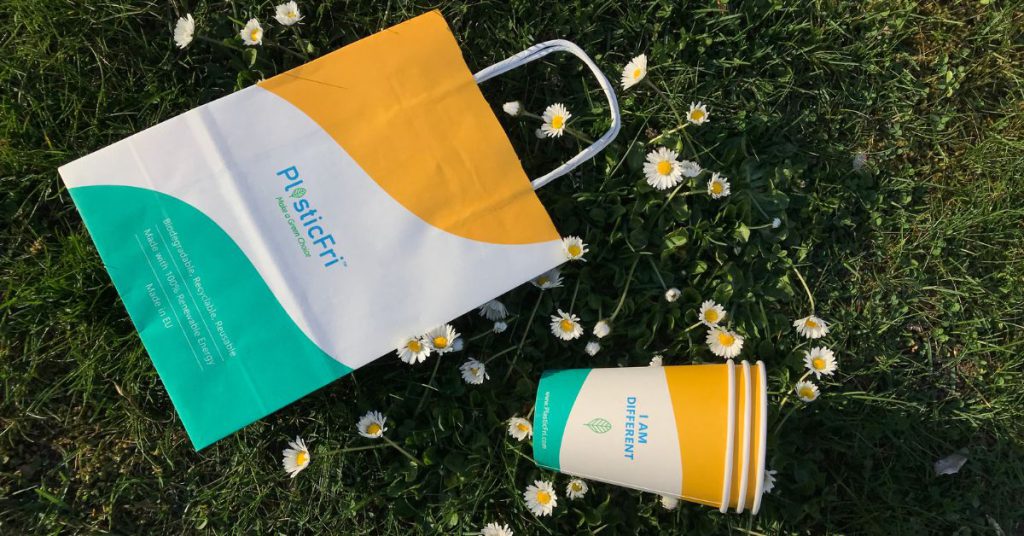
Asking Max about whether the business aims to localise its approach to Singapore, he pointed out a few differences.
“In our home country of Sweden, there is a well-established and optimised waste management system to enable circularity,” Max said. “In Singapore, due to scarcity of land, the possibilities are more limited.”
But due to this scarcity, Max believes there is an even a greater need locally for PlasticFri’s circular products.
To date, the company has sold over 50 million products to over 30 B2B customers in Europe, North America, and Asia. And perhaps Singaporean companies such as FairPrice will be joining that roster of clients, especially if PlasticFri does decide to set up shop in the country.
Also Read: Employees need a Copilot to boost productivity & ease brain drain. This webinar shows how.
Featured Image Credit: Singapore Management University Institute of Innovation & Entrepreneurship
Bored of bland healthy snacks, this M’sian trio is spicing it up with Asian-flavoured nuts
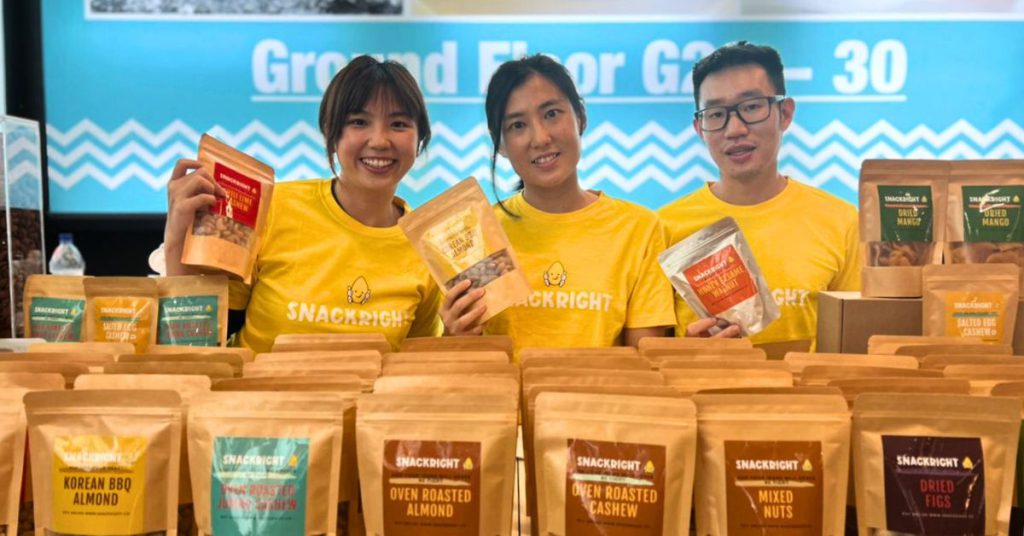
If you’re worried about snacking on junk food because it’s high in calories, SnackRight may help you feel less bad about it.
Founded by a dynamic trio—Lim Wen Shan, Melissa Lim Yi Xin, and Chan Jit Yen—SnackRight wants to bring more to the snack table.
The genesis of SnackRight can be traced back to its parent company, Oriion Food Specialties, which is currently headed by Wen Shan and his father, Lim Hock Leng, the founder.
However, it was a humble kitchen experiment that birthed SnackRight’s iconic flavoured nuts.
“We thought it was so good, so why not start our own brand and business-to-consumer division,” said Jit Yen, the chief production officer.
“We know everyone loves snacking but we knew our flavoured nuts brought more to the table. It was a healthier option of snacks that tasted as good as an indulgent one.”
Where snacking meets flavourful fun
The trio set out to transform the snacking market after realising there was a demand for healthy snack options without sacrificing flavour.
“We recognise that most people are in the middle ground, who want to eat healthily but still enjoy indulging [in] ice cream.”
“It’s not realistic to expect them to take it too far and only eat plain-roasted nuts as a snack. They love being healthy, but they also love their food,” Jit Yen told Vulcan Post.
Despite the saturation of the market for healthy snacks, SnackRight offers Asian flavours inspired by Malaysian cuisine to captivate consumers’ taste buds. These are oven-roasted, a method typically employed by other healthy nuts brands too.
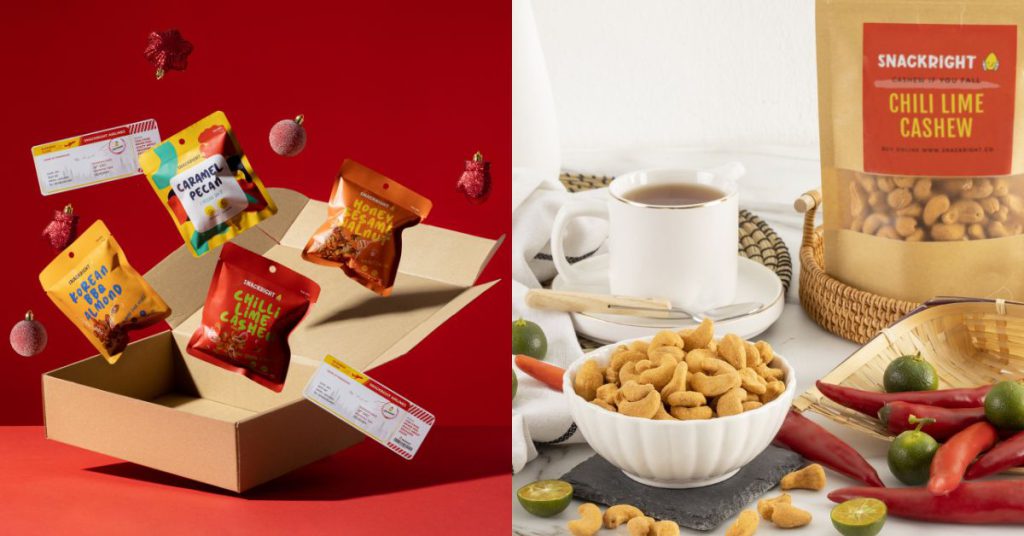
Their best-selling flavours are the Chilli Lime Cashew and Salted Egg Cashew varieties, followed by Korean BBQ Almond and Honey Sesame Walnut. They also have kid-friendly flavours such as Honey Sesame Walnuts.
Customers can get their best-selling snacks in mini packets for RM4.90.
According to Jit Yen, they can sell 1,000 packages or more of their flagship product, Chilli Lime Cashew, in a single month. However, they also have sold up to 300 packets in three days during peak seasons such as Chinese New Year.
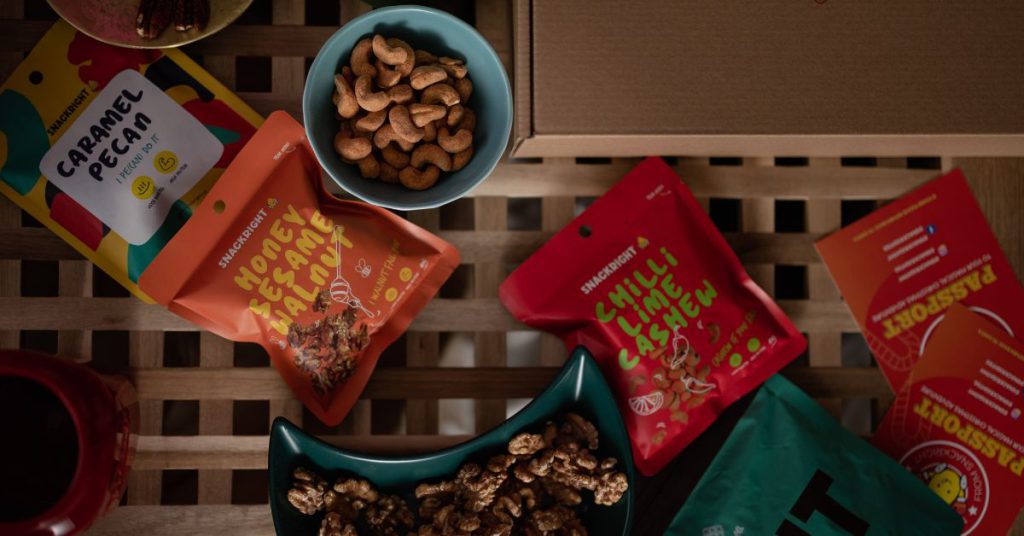
Driving the snack revolution
What sets SnackRight apart from its competitors in the nuts space isn’t just its delicious flavours or commitment to health, it’s the passion and expertise that drive every aspect of the business.
Wen Shan’s 12 years of experience in the snack production industry, coupled with his ambition to carry on his father’s legacy, ensures that SnackRight’s production processes are top-notch.
From sourcing the finest ingredients to perfecting the roasting techniques, Wen Shan ensures that every SnackRight product meets the highest standards of quality and taste.
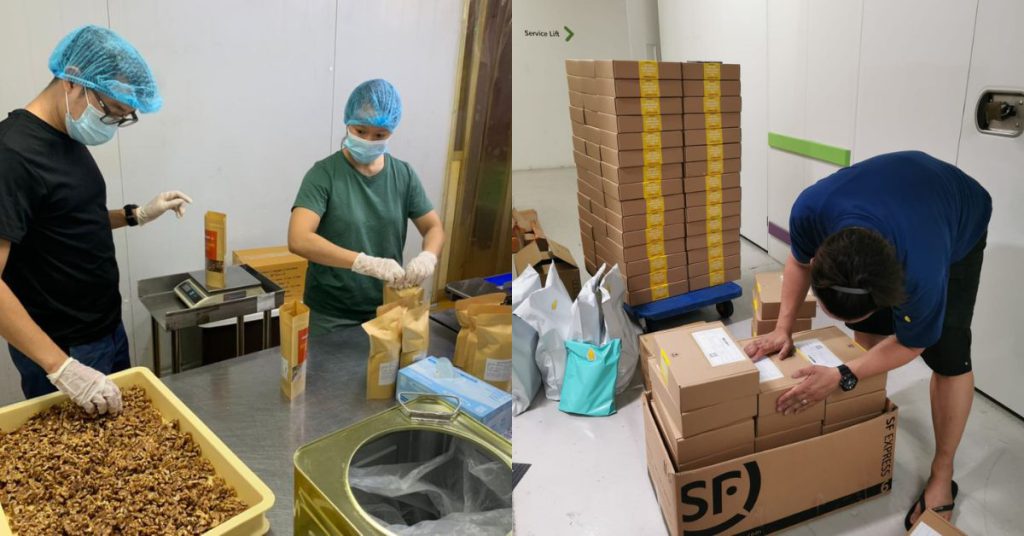
Melissa’s background in law may seem unconventional for the world of snacks, but it’s her passion for fitness and health that drives SnackRight’s marketing efforts.
Drawing from her experience as a marathoner and pickleball enthusiast, Melissa understands the importance of fueling the body with nutritious foods that don’t compromise on taste.
Her dedication to spreading the message of healthy snacking has been instrumental in SnackRight’s success.
Having co-founded a tech startup in Singapore before venturing into the world of snacks, Jit Yen brings an entrepreneurial perspective to the team.
Her entrepreneurial spirit, combined with her love for food and innovation, fuels SnackRight’s drive to push the boundaries of what’s possible in the snacking industry.
Whether it’s experimenting with new flavours or finding creative ways to reach customers, Jit Yen is always thinking outside the box.
Together, the trio form the heart and soul of SnackRight. Their shared vision of revolutionising the snacking industry, combined with their expertise and passion, has transformed SnackRight from a kitchen experiment into a thriving business.
From pop-ups to popularity
Over time, SnackRight’s popularity soared, prompting a full-time commitment from its founders.
“We are all invested full-time in growing this business. Initially, we started as part-timers and had pop-ups over the weekends to gauge the market response.”
“We were pleasantly surprised by the level of demand for our product, which gave us the confidence to launch and grow this business,” Jit Yen shared.
Navigating through market uncertainties when they first started, including the challenges posed by COVID-19, SnackRight exhibits resilience and adaptability.
Their strategy encompasses both offline and online channels, ensuring widespread accessibility while maintaining cost-effectiveness.
“Offline strategies such as participating in local events, and pop-up booths enable us to offer samples and engage directly with customers to showcase our products.”
“Meanwhile, our online efforts focus on driving conversions through targeted social media campaigns and email marketing,” she said.
With a focus on expanding product placement and forging partnerships, SnackRight aims to become a household name, both domestically and internationally, without compromising on their core values.
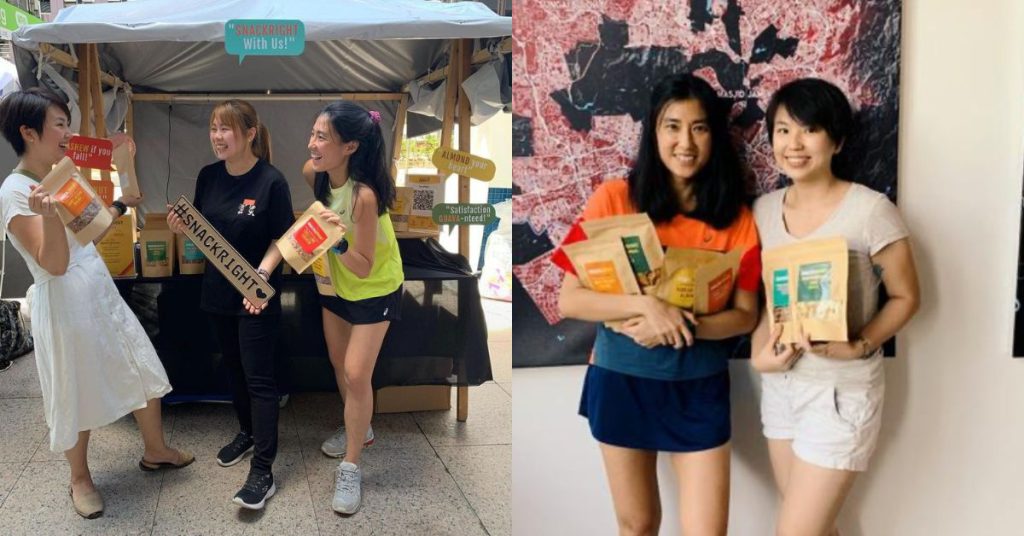
“Currently, our focus lies on expanding our product placement in grocery store chains and establishing partnerships with cafes, gyms, and hotels to increase our product’s presence across various channels.”
“We’re excited to share that we’ve recently succeeded in securing placement for some of our products in prominent chain stores,” Jit Yen added.
So if you’re on the hunt for new brands to add to your pantry, be it at home or in the office, keep an eye out for SnackRight.
- You can learn more about their business here.
- Read other articles we’ve written about Malaysian startups here.
Also Read: Employees need a Copilot to boost productivity & ease brain drain. This webinar shows how.
Featured Image Credit: SnackRight
OldTown, new ways: How the M’sian F&B chain is going green with a new café in Ipoh
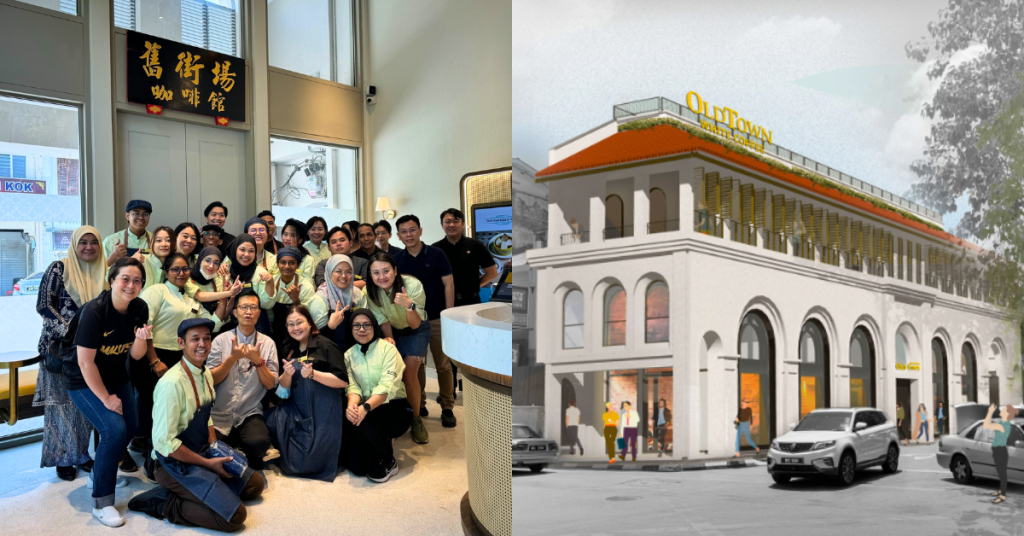
A stalwart in Malaysia’s F&B scene serving classic local foods, OldTown White Coffee might not be a business you’d consider a pioneer in this day and age.
But you’d be wrong.
A couple of weeks ago, I witnessed the celebration of Malaysia’s first large-scale cage-free aviary at a conference called the Wings of Progress for Better Welfare, organised by Humane Society International.
One of the speakers was Dawn Liew, the general manager at OldTown White Coffee. Amidst her sharing about the chain’s commitment to using cage-free chicken and eggs, she mentioned something that caught my attention—a new and exclusive outlet called the Earthcare Café.

Launched mere days ago (on March 30) within OldTown’s new Heritage Centre in Ipoh, this farm-to-table cafe is dedicated to, as its name suggests, caring for the earth.
Chatting with Dawn to learn more about this cafe, we learnt that the idea for this concept is something that’s been years in the making.
It all started in 2022, when American-Dutch beverage-centric company JDE Peet’s rolled out its Global Animal Welfare Policy, affecting all of its companies.
And if you’re wondering what that has to do with OldTown… JDE Peet’s is the company that bought the Ipoh-born chain for RM1.47 billion in 2018.
Due to this policy, OldTown began looking into ways to ensure products used in their stores serve not just consumers but also the environment and the welfare of animals.
“There is actually a balance where you can serve very good food which is delicious, but also good for your customers, and good for the environment as well,” Dawn said. “One doesn’t have to give way to the other.”
OldTown, new ways
For the past two years, OldTown has been working with Beacon Chicken, a Malaysian brand whose chickens are fed specially formulated seaweed-based feed that took 10 years to R&D.
These chickens are cage-free and thus experience better welfare compared to most poultry in the market.
Dawn revealed that OldTown’s chicken stock is mainly made using chicken supplied by Beacon Chicken. But they haven’t been able to exclusively source from Beacon Chicken for all chicken dishes.
“In order for Beacon to get the level where they can fully supply us, they need a bit of time,” she explained. This is as chicken is the main protein served by the chain, so the volume needed is huge.
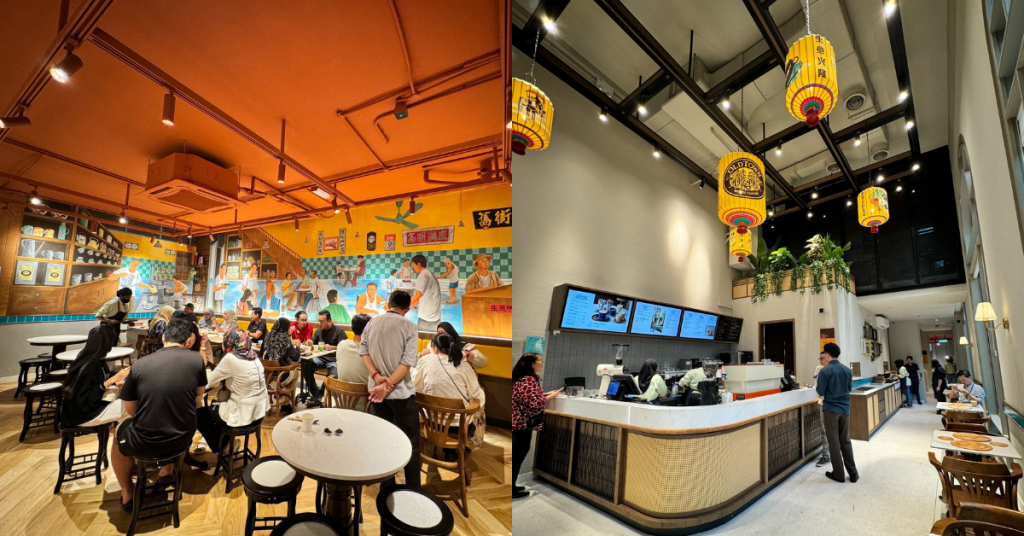
But even before JDE Peet’s, OldTown had already made efforts to be green. Back when the business was listed in 2011, they had one department that was called, serendipitously, Earth Care.
Driven to make environmentally friendly progress, this department would look at things like waste, water, and electricity management, leading to the switch to solar panels for their Ipoh factory.
But now, it’s time for the business to take their initiatives one step further by translating it to their dining side of things.
Leaves a good taste in your mouth
The newly opened OldTown Heritage Centre on Jalan Pang Lima is actually located on a UNESCO heritage site. This means that the architecture of the building needed to be of a certain standard not to take away from the area.
Inside the centre, there is a cultural and historical museum detailing the history of OldTown. There are also retail stores that sell the coffee brand’s products, as well as a vertical hydroponic farm.
But of course, a starred feature of this place is the Earthcare Café.
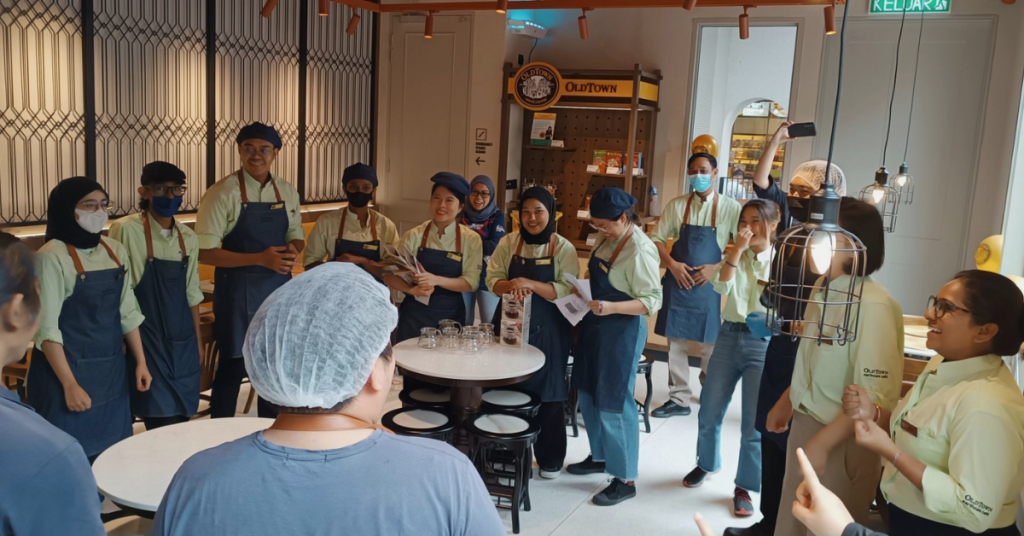
Here, the whole menu is centred around being environmentally friendly and promoting better welfare. All dishes here use cage-free chicken and cage-free eggs.
Highlighting some of the outlet’s unique offerings, Dawn said that instead of the iconic kaya and butter toast, they have a kurma and butter toast, which is lower in calories and offers a naturally sweetened flavour.
Dawn also said that seven dishes on the menu have received something called the Coolfood status. Coolfood is an initiative by the World Resources Institute (WRI), an independent US-based organisation, to help food providers sell dishes with smaller climate footprints.
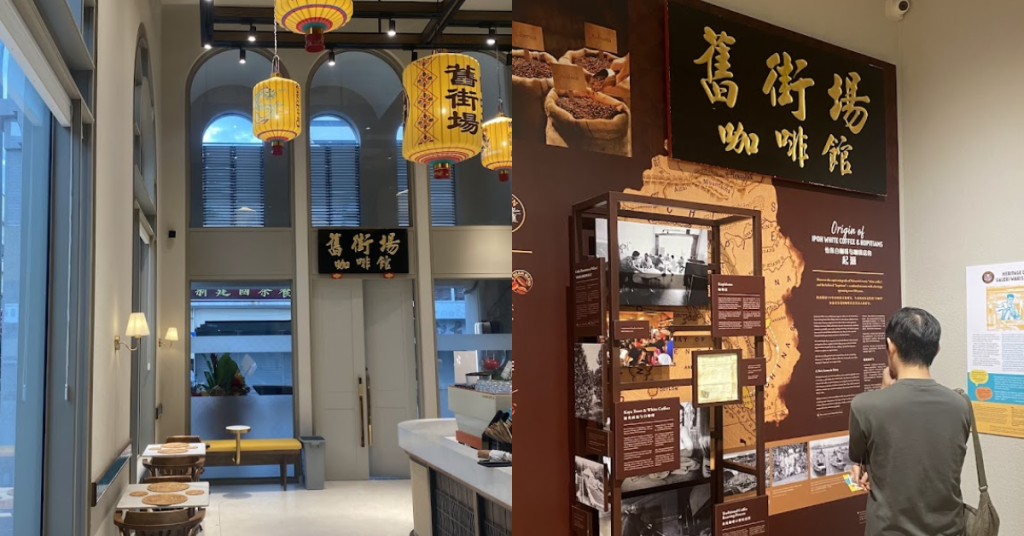
Dishes that with the Coolfood status emit at least 38% less carbon. But beyond carbon emissions, the recipes should also have high nutritional value, and the food should still be delicious, Dawn said.
Something else that’s unique to the outlet is that it serves four waves of coffee. Dawn explained the waves of coffee as such:
- First wave: Instant premix, which was popularised during the world wars, and is how OldTown White Coffee started.
- Second wave: Pulled, kopitiam-style coffee, usually using coffee roasted with sugar and margarine.
- Third wave: Espresso-based coffee. For Earthcare Café’s third-wave coffee, they use an Arabica, Robusta, and Liberica blend—something that is hardly seen in normal coffee shops, which typically only use the former two kinds of beans.
- Fourth wave: Filter coffee, typically hand-poured and using specialty blends of coffee beans.
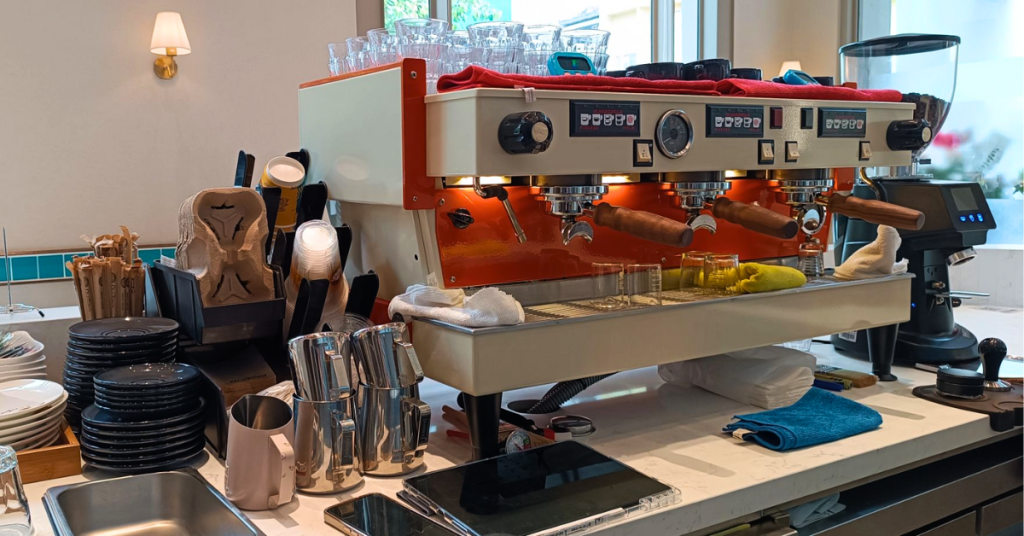
Breaking the silence
But you might be wondering, “Why haven’t I heard anything about OldTown’s green efforts?”
Well, that’s because the team has been intentionally holding back on publicising their moves externally.
“We need to be very certain that all our stores are practising what they need to be practising,” Dawn explained. “And then we will start saying it out loud. We don’t want it to be greenwashing.”
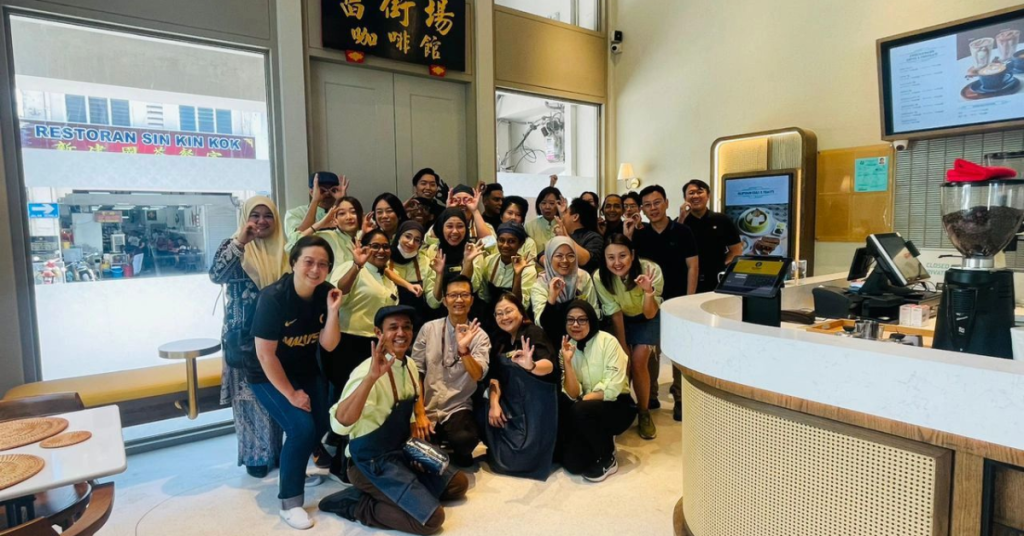
Rather, their focus has been turned inward, educating their own staff about climate change and why it matters.
“Our own people, our associates, our staffs, must understand why. The education internally has been huge,” Dawn said. “Once they have this [knowledge] at their fingertips, it becomes easier for them to communicate them outwards.”
Communicating this to franchisees is necessary too. Dawn said that the goal for them ultimately boils down to profitability, so the HQ must ensure that the cost of their changes is never overly taxing on the franchisees.
In any case, OldTown has been making these positive changes in small increments over the years. But as time goes by, the small steps will all add up to one big leap.
And the Earthcare Café is one culmination of all those efforts, giving us a taste of what OldTown White Coffee has in store for the future.
- Learn more about OldTown White Coffee here.
- Read other articles we’ve written about F&B businesses here.
Also Read: Why M’sians need to join this 2-day event in PJ that’ll boost your understanding of IPs
Featured Image Credit: OldTown White Coffee / A3 Projects
South Korean convenience store chain Emart24 under probe for failing to pay salaries
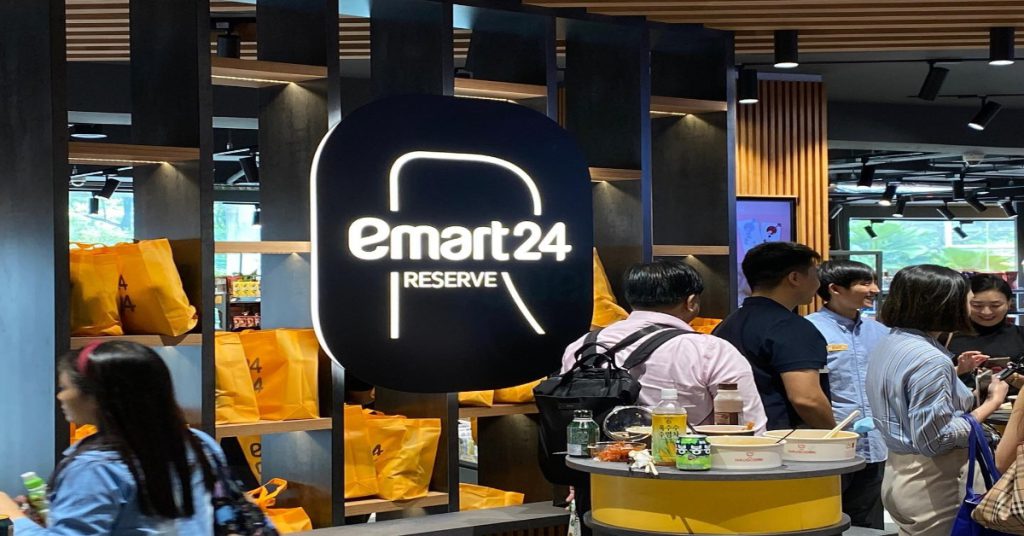
South Korean convenience store chain Emart24 is currently under probe by the Ministry of Manpower (MOM) for allegedly failing to pay former employees.
According to a news article by CNA, the Tripartite Alliance for Dispute Management (TADM) received claims from 15 ex-employees for unpaid company salaries, and are currently receiving assistance.
“TADM has successfully helped five workers to reach an agreement with Emart24, and the company has begun repaying them,” said the organisation and MOM in a joint statement on Saturday (Apr 13).
“TADM is in the process of scheduling mediation sessions for the remaining workers.”
Employees who are affected and require employment assistance have been referred to the labour union’s Employment and Employability Institute.
MOM and TADM have also reminded employers to pay staff on time and advised employees who require assistance with salary claims to approach TADM early via the Tripartite Alliance website.
Emart24 debuted in Singapore at the end of 2022 and eventually opened three outlets around the city-state. However, all Singapore outlets have closed since mid-March this year.
Featured Image Credit: Emart24 Singapore via Facebook
Also Read: South Korean convenience store chain Emart24 abruptly closes all 3 outlets in S’pore